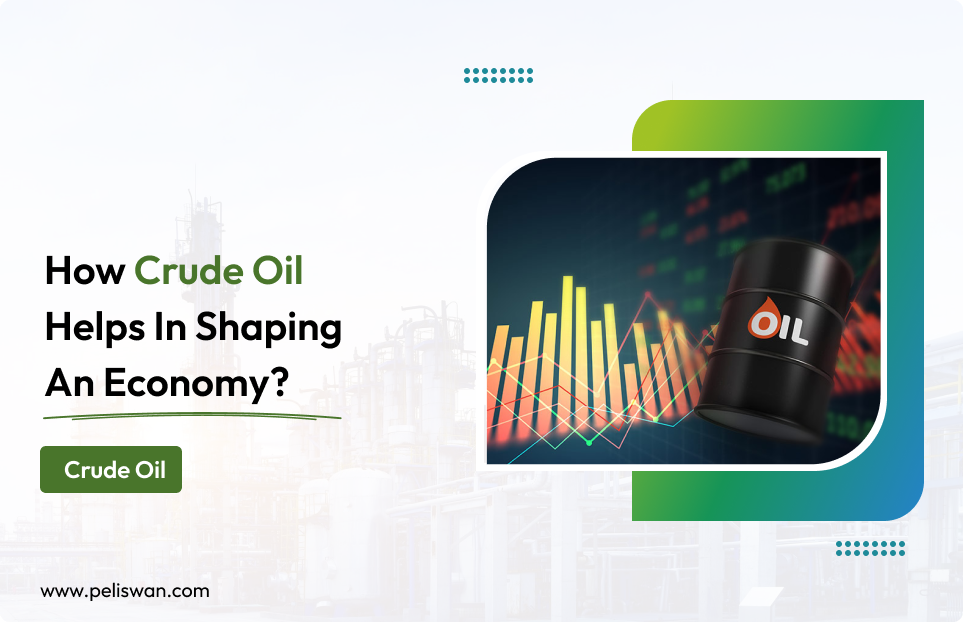
Jagat Jani
February 26, 2025
How Crude Oil Helps in Shaping an Economy?
Crude oil, often referred to as “black gold”, plays a fundamental role in shaping economies by influencing industrial growth, government revenues, inflation, trade balances, and global geopolitics. As the primary source of energy for transportation, manufacturing, and electricity generation, oil is crucial for economic development. Countries with significant oil reserves often experience economic booms, while those reliant on oil imports are vulnerable to price fluctuations.
Below are the key ways crude oil shapes an economy:
Industrial Growth and Energy Demand
Crude oil is the backbone of modern industrial economies. It provides energy for manufacturing, transportation, and electricity generation, making it essential for industrial production. Countries with abundant oil reserves, such as Saudi Arabia, the United States, and Russia, often experience economic growth due to high revenues from oil exports.
Oil fuels industries such as:
•Primary Energy Source: Crude oil is refined into products like gasoline, diesel, and jet fuel, which power vehicles, airplanes, and ships.
•Transportation: Cars, trucks, ships, and airplanes rely on fuel derived from crude oil.
•Manufacturing: Petrochemicals from oil are used to produce plastics, fertilizers, and a wide range of chemicals.
•Electricity Generation: Some countries use oil to generate power, especially in areas where alternative energy sources are limited.
Economic Growth and Development
•GDP Contribution: The oil industry significantly contributes to the Gross Domestic Product (GDP) of oil-exporting countries. Revenue from oil exports can fund infrastructure projects, healthcare, education, and other public services.
•Employment: The oil sector provides jobs directly in extraction, refining, and distribution, as well as indirect jobs in transportation, manufacturing, and services.
Government Revenues and National Budgets
Oil-producing countries often depend on crude oil as a primary source of government income. Governments earn revenue through:
• Taxes and royalties on oil production
• Profits from state-owned oil companies
• Export earnings from crude oil sales
In oil-rich nations, like Venezuela and Nigeria, oil revenues fund infrastructure projects, social welfare programs, and public services. However, over-dependence on oil can lead to economic instability when prices drop.
Inflation and Consumer Prices
The price of crude oil directly affects inflation. When oil prices rise, production and transportation costs increase, leading to higher prices for goods and services. This reduces consumer purchasing power and slows economic growth. Conversely, lower oil prices reduce costs for businesses and consumers, boosting economic activity.
Trade Balance and Currency Strength
Oil exports significantly impact a country’s trade balance and currency value.
• Exporting countries: Nations that export more oil than they import enjoy trade surpluses, strengthening their currency.
• Importing countries: Countries reliant on oil imports, such as Japan and India, face trade deficits when oil prices rise, weakening their currencies.
Geopolitics and International Influence
Oil is a key factor in global politics. Countries with large reserves have economic and political influence, as seen with OPEC (Organization of the Petroleum Exporting Countries), which controls a significant portion of the world’s oil supply. Oil dependence also leads to geopolitical conflicts, as nations compete for energy security and resources access.
Economic Diversification and the Future of Oil
As the world moves toward renewable energy, economies heavily reliant on crude oil face the challenge of diversification. Countries like the UAE and Saudi Arabia are investing in non-oil sectors such as tourism, technology, and green energy to prepare for a future with reduced oil dependence.
Investment and Financial Markets
•Stock Markets: Oil companies are major players in stock markets. Their performance influences overall market trends.
•Commodity Markets: Crude oil is a key commodity traded globally. Its price volatility affects financial markets and investment strategies.
Technological Innovation
• Research and Development: The oil industry drives technological innovation in areas such as drilling, extraction, refining, and alternative energy sources.
• Energy Transition: As the world moves towards renewable energy, the oil industry is also investing in technologies to reduce carbon emissions and develop sustainable energy solutions.
Crude oil plays a pivotal role in shaping economies by driving industrial growth, government revenues, inflation, trade balances, and geopolitical influence. While oil-rich nations benefit from high revenues, economic dependence on crude oil also poses risks due to price volatility and environmental concerns. As the world transitions to renewable energy, economies must adapt and diversify to ensure long-term stability and growth.
Frequently Asked Questions ( FAQ)
-
Which country has the best Crude oil?
Malaysia is often considered to have the highest quality crude oil, particularly “Tapis” crude, which is light, sweet, and has low sulfur content, making it highly desirable for refining.
2. What is the relationship between crude oil and currency value?
-
Oil-exporting countries: Higher oil prices strengthen the national currency by increasing foreign exchange reserves.
-
Oil-importing countries: Rising oil prices weaken their currency as they spend more on oil imports.
3. How does the transition to renewable energy impact oil economies?
As the world shifts to renewable energy, oil-dependent economies face revenue declines. Many countries are investing in economic diversification to reduce reliance on crude oil revenues.
4. How does crude oil affect trade balances?
-
Exporters: Experience a trade surplus when oil prices are high.
-
Importers: Face trade deficits when oil prices rise, increasing import costs.


